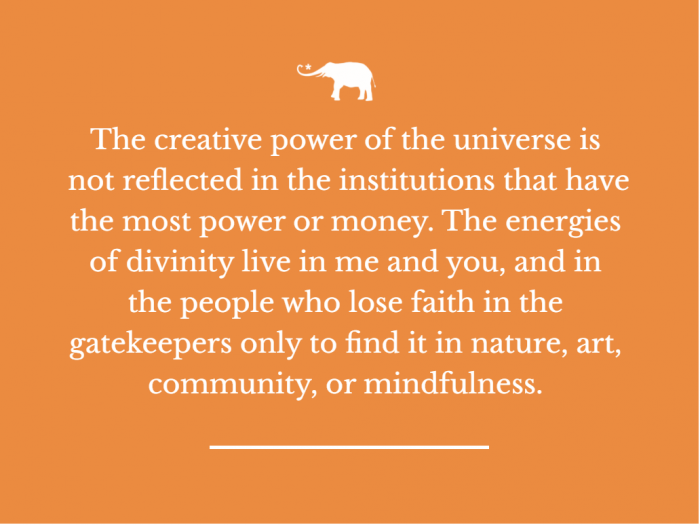As an ordained interfaith minister and chaplain, I fully respect and support the importance of religious freedom. That is true and I support the politics of religious discrimination because I see it as an accelerant to the decline of harmful institutionalized religion.
When a powerful church is willing to step into the light and claim rights to callous, shitty values draped in “theology,” I smirk, knowing that they are adding a big push to the pull factors that are already threatening their existence.
In the dominant, western cultures, there is no single reason for the decline of religion. There are many intractable challenges. This includes structural changes in how people relate socially, such as the rapid and dramatic shifts in communication from technology.
Many religions have failed to tackle the big questions of our times, including the ethics of capitalism and the true meaning of earthly stewardship. Many speak about justice, but at best give side eye to the horrors they have committed and endorsed.
There is also a tendency, especially among churches, to misjudge their relevance and influence. This easily leads to an inability to read the room.
One of the most powerful and least understood factors in neoliberal cultures is the rise of the individual. This ‘slow then fast’ adjustment has created sweeping changes in society.
One example has been the strengthening of the idea of human rights and the push back against violence, discrimination, and other dehumanizing acts, as seen from trans people. It is easy to imagine how a powerful, hierarchal, and patriarchal organization may feel threatened by the rise of the individual.
But this shift came to stay— just look at the changes in parenting over the last few decades. Ignoring this change or worse, acting against it, marks people and organizations ripe for cancellation, quick or slow.
In my own backyard, Australia is going back and forth on thorny issues around religious discrimination. While there is a measurable decline in religious tolerance on the streets —where it matters most — there has recently been a political push for allowing religious institutions concrete freedoms to discriminate, under the guise of value statements.
These statements are meant to be signed and followed, and if not, then the organization can let the person go. The institutions that are supporting this idea swear that it won’t affect how they treat students and is not about attributes that are otherwise prohibited from discrimination, such as race or sexuality. They are values tied to tenets of faith.
But Australia is notorious for dog whistling on social issues, for example by forcing a 2017 national postal survey before allowing same-sex couples to get married. It’s easy to imagine that these bills that provide freedom to discriminate are another whistle to the institutions that wield old-school influence.
This is shameful on three fronts:
- That government bows to organized religion in a way that goes against something that it is their role to protect.
- Leadership in the churches and other organizations think that this is what is worth their best efforts, especially after the polycrisis we wake up to day after day.
- Worst of all, the people who are entrusted to share and teach us about Divinity are choosing marginalization and hate over justice, equality, and love.
After the shattering challenges of 2021, I had the opportunity to plough through December with the blessing of reflecting on the Christian meaning of the birth of Jesus (spoiler: I am not a Christian). It was beautiful— a story of love, faith, hope and importantly, humanity, all told from an outsider POV.
Yet, these knuckleheads choose the exact opposite. Like they just didn’t show up for this part of the story. As if they were somehow removed from their own extirpation, or what the possibilities of a true pandemic might bring.
No, instead we will focus on our underserved righteousness that says we know better. And individuals don’t matter because we are a privileged body. We will not look outward to see that it is individual thought, feeling and perception that are now shaping the culture. We cannot perceive that we are, in fact, mocking the values of a majority, even those in the pews.
Notably, we will make these decisions based on a dusty interpretation of history. We will not speak with people, especially those considered outsiders. And in no way will we generate an honest invitation to speak to God about what is allowed in worship.
And so my question is, what is it you are worshipping? History? Poor theology? Your own ideas? Because it’s not Divinity. When Spirit is removed from ministry, soon so will all the people.
So yeah, I support religious discrimination because it accelerates the decline of the very type of institutional religion that has failed people. This is seen not just from attrition of members, but also in the loss of political influence and public trust.
In the trenches, ministers are as burnt out as anyone after two years of adjustments. Petty stances from leadership can easily be the thing that pushes them into resignation.
But there is good news here, because the creative power of the universe is not reflected in the institutions that have the most power or money. The energies of divinity live in me and you, and in the people who lose faith in the gatekeepers only to find it in nature, art, community, or mindfulness.
I understand that for the people living through the discrimination, it is demeaning and dehumanizing, and I wouldn’t wish it on anyone. Go fight your good fight.
But I also pray to see more of God through the mirror of individual lives. So bring on the discrimination.


 Share on bsky
Share on bsky





Read 0 comments and reply